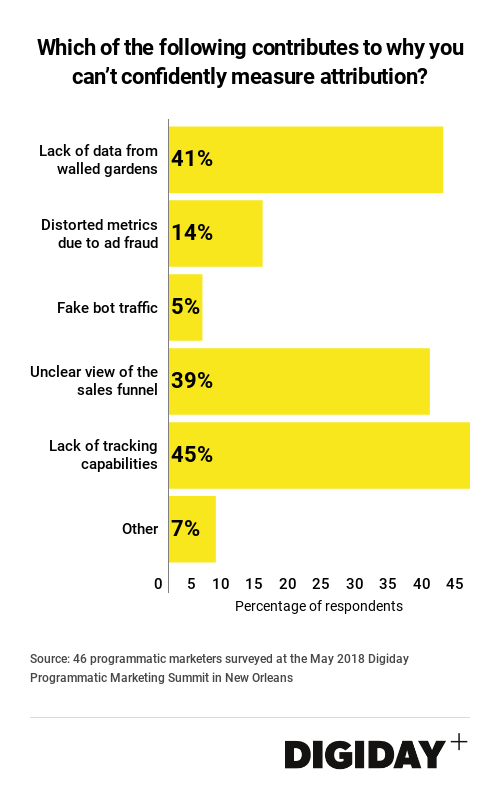Digiday Research: Tracking capabilities and ‘walled gardens’ are stifling attribution measurement

This research is based on unique data collected from our proprietary audience of publisher, agency, brand and tech insiders. It’s available to Digiday+ members. More from the series →
Without meaningful attribution measurement, marketers lack the ability to accurately gauge whether certain ads or campaigns lead to purchases or were simply wasted ad dollars. But a range of challenges continue to stifle marketers’ ability to accurately measure attribution, according to a recent Digiday survey.
Respondents identified a lack of tracking capabilities, a lack of data from major platforms, and an unclear view of their sales funnels as key factors inhibiting their ability to measure attribution accurately.
As marketers look beyond last-touch attribution modeling and attempt to use more comprehensive multi-touch models, the need to track people accurately across devices is intensifying. However, 45 percent of marketers claimed they currently lack the capabilities to do so. A host of measurement companies have popped up promising to fix that problem, but marketers say results have been mixed. For smaller agencies and brands already facing tight budgets, the cost of using such services is also relatively high.

Another challenge marketers face when it comes to attribution is the so-called “walled gardens” of Facebook and Google, and increasingly Amazon. Together they have dominated marketers’ digital ad budgets, but have come under criticism for withholding data that makes more accurate attribution measurement possible. Roughly four-in-ten marketers say the lack of data from walled gardens is an issue. These platforms have each released their own attribution tools in attempt to placate marketers, with less than enthusiastic response.
Lastly, marketers struggle to understand their customer’s journey to purchase, a problem exacerbated by the previous challenges. Thirty-nine percent of marketers confront this issue. Without a clear understanding of consumers’ online behaviors, marketers can’t be sure how far along the sales funnel they are and what ads they should be exposed to. Ultimately, marketers’ cloudy vision of the sales funnel can’t be rectified until marketers improve their tracking capabilities and are granted access to more data.
One could reasonably argue that the problem attribution measurement is becoming harder, not easier, to solve. The control of data by walled gardens is getting worse and many are using privacy updates to further restrict data sharing, leaving marketers with the decision to fully trust the platforms or move their ad spend elsewhere where it can be more easily monitored. As a result, less than one-in-five U.S. marketers claims to be able to confidently measure attribution according to earlier Digiday Research. The rates for European marketers’ ability to measure attribution do little to paint a rosier picture.
Spare a moment for the poor marketers who hoped the issue of reliable attribution measurement would be resolved by 2016.
More in Marketing

Ahead of Euro 2024 soccer tournament, brands look beyond TV to stretch their budgets
Media experts share which channels marketers are prioritizing at this summer’s Euro 2024 soccer tournament and the Olympic Games.

Google’s third-party cookie saga: theories, hot takes and controversies unveiled
Digiday has gathered up some of the juiciest theories and added a bit of extra context for good measure.

X’s latest brand safety snafu keeps advertisers at bay
For all X has done to try and make advertisers believe it’s a platform that’s safe for brands, advertisers remain unconvinced, and the latest headlines don’t help.





